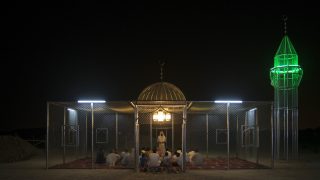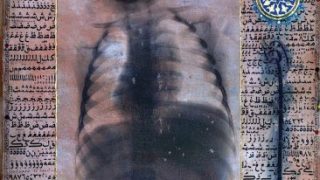The mutaween are easily recognized by their beards, short robes and the prayer marks on their foreheads. They are the foot soldiers of the Committee for the Promotion of Virtue and the Prevention of Vice, Saudi Arabia's religious police. They are charged with preserving faithful application of Islamic law, in public places, markets and commercial complexes, and preventing the occurrence of anything religiously proscribed. Other duties of theirs include forbidding illegitimate gender mixing, calling others to prayer, encouraging women to cover their hair and to don a headscarf in accordance with Islamic teachings. The mutaween are a powerful force, one that does not feel bound by man-made law or the regular police. It suffices for them to harbor doubts that improprieties are being committed; if so convinced, they will set out to try and change it by their own hands, or if they cannot then by their tongues. In their beliefs, the least part of faith (pun off of Hadith related by Muslim, Book 1:177) is to tell others: "hide your hair!", "that's prohibited!", "tut tut, my sister …," "tut tut, my brother …," "it's time for prayer," "that's forbidden," "fear God," and so on.
The Committee's Ascendancy
Their eyes are everywhere, always watching, seeking to plug every breach of Islamic morals they see making its way into the open. Righteousness in hand, they see themselves as bound to impose change, and no one can stand in their way. They form the long arm of the state, obliged to put an end to everything it believes is forbidden (a concept whose boundaries extend to whatever the committee believes ought to be "forbidden"). Thus it becomes "forbidden" for a man and woman to be alone together and, if they're seen by the religious police, the mutaween will hurry to investigate and ascertain the nature of their relationship.
In the Kingdom of Saudi Arabia, it is the committee that proscribes and prescribes. It determines what is forbidden and permitted, setting the bounds of what is proper for society. They are the ones charged with protecting Saudi society from the dreaded encroachments of Western civilization. They are the ones who prevent women from sitting behind the steering wheel of a car “for fear they might lose their virginity.” The committee interferes in every reformist initiative the kingdom elects to attempt. Simply permitting women to work in women’s accessories shops required lengthy debate and discussion, and even now the committee remains unsure of this decision. It views it as the beginning of Westernization in Saudi society, encouraging moral dissolution and the collapse of the barrier studiously erected by the kingdom year in and year out. They fought the decision tooth and nail, issuing threats and sounding alarms. But the insistence of the labor minister on implementing this reform set all their efforts to naught.
The committee exercises authority in society. The change that it permitted was a small one, effected only after tremendous pressure was brought to bear by a society that is one part native citizen — who understands the mystery of public affairs — and also a mere resident who seeks to transfer the features of his native country and graft them onto the society in which he now lives. Both fear the committee, and seek to avoid its agents when they are deployed in public places, gatherings and markets, spreading their teachings upon all manner of people. All are afraid of their enormous power to uncover violations, and interfere in the details of daily life. Instead of confronting them, most seek to accommodate this force, endowed with the power to render even the simplest of things an unforgivable sin.
What is the Committee?
The religious police was founded in Saudi Arabia in 1940, centered in the capital city of Riyadh. It encompassed some 4,000 members known as “the muttawah,” and headed by an executive director appointed by the King.
This official body was charged with the task of “applying the laws of the Islamic law in public markets, and elsewhere” and with preventing any violations of those laws from occurring “that show disrespect for the Islamic faith.”
The mutaween are deployed in areas of public gatherings, pushing people to answer the call to prayer, prodding them to fulfill this collective obligation, and moving to cease all buying and selling until the time for prayer is concluded. The committee forbids public musical concerts, or even private ones in public places, and reserves the right to listen in on young people’s cell phones in search of text messages violating the principles of Islamic law.
The kingdom founded a Higher Institute for the Promotion of Virtue and Prevention of Vice in Umm al-Qura University, which holds courses that research the committee’s role and its function as a social institution.
The committee issued a long list of things both forbidden and permitted, one that it is working to apply in Saudi society. The committee’s accelerating pace is accompanied by the growing influence of Saudi expatriates returning from abroad, as well as the social and political currents demanding freedom that have arisen in neighboring states like Yemen and Bahrain.
Terrorism, Pursuit and Death
Many people harbor negative images of the Saudi religious police, images resulting from tragic incidents where lives were needlessly lost. These events left a poor impression of the committee’s record and exposed it to accusations of violating human rights. The committee has been accused of increasing the number of girls who died as victims in a fire that broke out in a girls’ school in Mecca in 2002, when mutaween prevented firemen and medical personnel from entering the school grounds, shutting the doors on girls attempting to escape the flames, on the pretext that the girls “were not wearing the hijab” and that “girls cannot be uncovered in front of strangers.”
Another instance that swelled the chorus of criticism directed against the mutaween was the manhunt they undertook for a suspect. In what came to be known as the “Baljurashi Incident,” the mutaween’s hot pursuit led to the death of one man and the severe wounding of his wife and one of his children. Shortly afterward the director of the Committee for the Promotion of Virtue and the Prevention of Vice, Shaykh Abd al-Latif al-Shaykh, issued a ruling forbidding his men from engaging in hot pursuits, reserving such operations for the responsible security forces.
The kingdom does not desire to see the committee turn into an enemy within, one that would sow terror in people’s hearts. Yet Saudis have come to discern in the behavior of some of its members a harshness that serves only to produce alienation and widening social cleavages. What members of the religious police see as guidance, citizens have come to regard as unwarranted interference in their personal affairs. The guidance that the mutaween seek to offer differ from person to person. Although Saudis have grown accustomed to the committee, and to viewing its standards as a guide to matters of right and wrong, nevertheless they have come to treat it with a sort of hesitation. Society looks on it as an organization that preserves a status quo based upon Islamic teachings, but many feel that some of its members’ behaviors have become a disturbance. In other words, the religious police have come to represent a complication that everyone seeks to avoid or circumvent (it makes little difference which).
A curious thing is happening in Saudi Arabia. The society that for a long time sought to evade the committee’s influence has begun to show signs of restlessness. Curious events, word of which social media networks have helped to spread, have begun to form pressure groups within the country and helped to create a civil society attempting to demand its rights from the state, just as the state demands duties of them. Through Twitter, Facebook and YouTube, news of events pertaining to the committee and its members spread these days like wildfire. The twitter “hashtag” can shape public opinion and catalyze demands for change. Indeed the committee, as an organization, has been subjected to a twitter campaign calling for its dissolution.
The Committee and Saudi Youth
The youth that used to deal cautiously with members of the committee — being as they were the mutaween’s primary target — no longer hold themselves back from reacting defensively. Recent times have witnessed movements by Saudi youth directed against members of the committee. Those once accustomed to passively obeying orders without saying a word have begun to aggressively confront the religious police, even employing violence. News has spread of incidents of youth gathering to challenge members of the religious police: a Saudi girl attacked one of the mutaween, throwing a rock at a member’s head after she was found spending time alone with a foreign youth “improperly.” Young women have physically struck members of the religious police after being subjected to their criticisms, including the famous incident of the Saudi girl at the Hayat mall.
A video of the girl publicly defying the mutaween was posted to YouTube, and sent a shockwave through Saudi society. She appears in the video calling upon members of the regular police after the mutaween ask her to leave the mall because her freshly painted nails were visible; moreover, she berates and chides them. The video spread like wildfire, shocking the society used to treating both issues pertaining to women and to the religious police delicately. But it stirred a debate around the girl’s violent reaction and the manner in which she dealt with the kingdom’s supposed deterrent force, as well as of the mutaween’s overstepping the bounds of the role they have attempted to cultivate as advisers and managers.
Is Saudi Arabia ready to cast off the committee, and to reconsider its position toward the organizations charged with preserving a pristine image of society?
Translated by Al-Monitor



